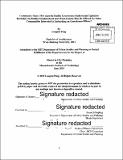Community oasis : how does the Dudley Greenhouse build social capital to revitalize the Dudley neighborhood and what lessons may be offered for other communities interested in embarking on greenhouse efforts?
Author(s)
Peng, Longrui
DownloadFull printable version (14.64Mb)
Other Contributors
Massachusetts Institute of Technology. Department of Urban Studies and Planning.
Advisor
Susan Silberberg.
Terms of use
Metadata
Show full item recordAbstract
This thesis proposes that social capital, as the vehicle for community-building at a community-based scale, can address the strains placed on a neighborhood from revitalization. This strategy can play a vital role in the urban design process of the local neighborhood. My thesis presents a case study of the Dudley Greenhouse in Dudley Square, Boston, Massachusetts, which plays a role in revitalizing the local neighborhood by building social capital in the space. Residents are suffering from unsustainable development, poverty, unemployment, crimes, and investment isolation. After many years of grass-roots efforts, the Dudley neighborhood revitalization is gathering momentum. The Dudley Greenhouse is a result of very deliberate organization and community-building strategies. It builds social capital to support the people in this low-income neighborhood. The structure and relationships in the Dudley neighborhood are rebuilt to reconnect the isolated community with resources of the city and region. Other than simply offering financial benefits and/or services to the low-income people, the Dudley Greenhouse builds up the networks of local residents through a process that supports their common values and contributions in the improvement of the local community. The reputation of the Dudley Greenhouse is overwhelmingly positive. The users of the greenhouse are excited to describe the progress they have made toward the goals in different stories, and expressing the desire of the continuous participation. Participants are gaining increased food produces and access to them, building community through networking with others in the communal gathering space with multiple links to the outside areas. All the evidence point to the significance of the combination of physical construction as an incubator and storage, social capital creation as a community revitalization engine, and the mechanism of such non-economic, less costly forms of solutions which can be an important source and addition of power and influence in the urban design process.
Description
Thesis: M.C.P., Massachusetts Institute of Technology, Department of Urban Studies and Planning, 2015. Cataloged from PDF version of thesis. Includes bibliographical references (pages 97-99).
Date issued
2015Department
Massachusetts Institute of Technology. Department of Urban Studies and PlanningPublisher
Massachusetts Institute of Technology
Keywords
Urban Studies and Planning.